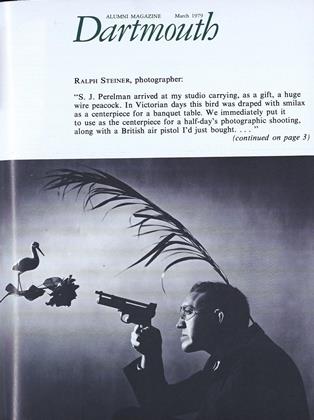When the United States declared normalized relations with the People's Republic of China last December, the announcement meant more to one Dart- mouth student than just the opening of new trade routes for Coca Cola. Five years ago, Kei-king Lam '82 escaped from that country, leaving behind a mother, brother, and sister - a family he hopes to be united with next summer, thanks to the new agreement.
Lam's problems at home began during the Cultural Revolution of the late sixties, when both his parents - as intellectuals and professors - were attacked as "reactionaries," placed on trial, and eventually convicted of crimes against the government. The main evidence against Lam's father included a series of newspaper articles he had written criticizing the disparity between Party concerns and the needs of "ordinary" people. Condemned to a political prison, he died there in 1969, because of poor living conditions, hard forced labor and little food, Lam says.
Graduating from high school two years later. Lam wished to study medicine, but was prevented by his dubious political background. Instead, he pursued music at the university in Canton, preparing all the while for escape. Lam's description of these last two years in China reads like an adventure novel: swimming and exercising before and after classes to build up his strength, gathering maps and information from trusted friends, buying up food and camping supplies. Finally feeling ready, Lam set off from Canton in November 1973 for the hike across the mountains toward Hong Kong. Traveling by night and hiding by day, he reached the coast 16 days later, swimming across to the British colony on December 3.
Lam spent only ten months working in Hong Kong - just long enough to save up the plane fare to New York. Though he has an aunt in Syracuse, Lam chose to live by himself in the city, working at a series of odd jobs and learning English, at first through evening adult-education classes and later at the Lower East Side Preparatory School. "I had a lot of trouble during this time," Lam recalls. "For instance, if someone stopped me to ask the time, I'd usually just run away." By the time Lam was sufficiently prepared for college, he was 23. Accepted by both Dartmouth and Cornell, he chose Hanover for its smaller size and the fact that with fewer Chinese students here, he would be forced to interact with more Americans.
But so far, Lam's two terms at Dartmouth have been mostly frustrating - an experience, he says, "that has been a blow to my self-confidence." Though conversation comes relatively easily, the more complex English of lectures and textbooks often escapes him. To keep from lagging behind, Lam must study harder than most students, though this further cuts him off from the social interaction which could in turn help him learn better English. His grades also reflect his trouble, a point leaving Lam worried about his plans to go on to medical school.
As for other students, Lam finds them friendly in general, but often ignorant of Eastern culture and patterns of thinking. "It seems most students here are from higher society. I think the middle and lower classes get along better with foreign students like me; they understand us better." Lam sees the situation as indicative of an imbalance in East-West relations - the Orient being more interested in the Occident than the other way around. He hopes the new relationship with China may help reverse this trend.
Though Lam is pleased with the current regime in Peking, he doubts such liberalism can be maintained over a long period of time, so he still plans to become a citizen of the United States. Since the change in his status will not go through until September, Lam will be on uncertain ground if he goes ahead with plans to return home this summer. He is now contacting the State Department to learn what protection he can expect with only "permanent-resident" status.
In the meantime, Lam is gradually supplementing his studies with outside activities. This term he joined the Dartmouth Symphony Orchestra, playing the violin he studied in Canton.
 View Full Issue
View Full Issue
More From This Issue
-
 Feature
FeatureNine to Midnight (or two if hot)
March 1979 By Shelby Grantham -
 Feature
FeatureSTEINER: by himself
March 1979 -
 Books
BooksNotes on lost causes and an enlistment against Nature, as brave as it was brief.
March 1979 By R. H. R. -
 Article
ArticleWinter Carnival Blues
March 1979 By Biĺ Conway '79 -
 Article
ArticleLiberal Learner
March 1979 By M.B.R. -
 Class Notes
Class Notes1974
March 1979 By STEPHEN D. SEVERSON
Article
-
 Article
Article"THE DARTMOUTH" ENLARGED
November, 1911 -
 Article
ArticleClass Secretary of the Year
JUNE 1972 -
 Article
ArticleCommunity Engineering Service
APRIL 1973 -
 Article
ArticleAlumni Publications
April 1945 By James M. Langley '18. -
 Article
ArticleThe God Question
July/August 2008 By Lauren Smith '08 -
 Article
ArticleWestchester
FEBRUARY 1970 By WALTER W. VAIL '58

